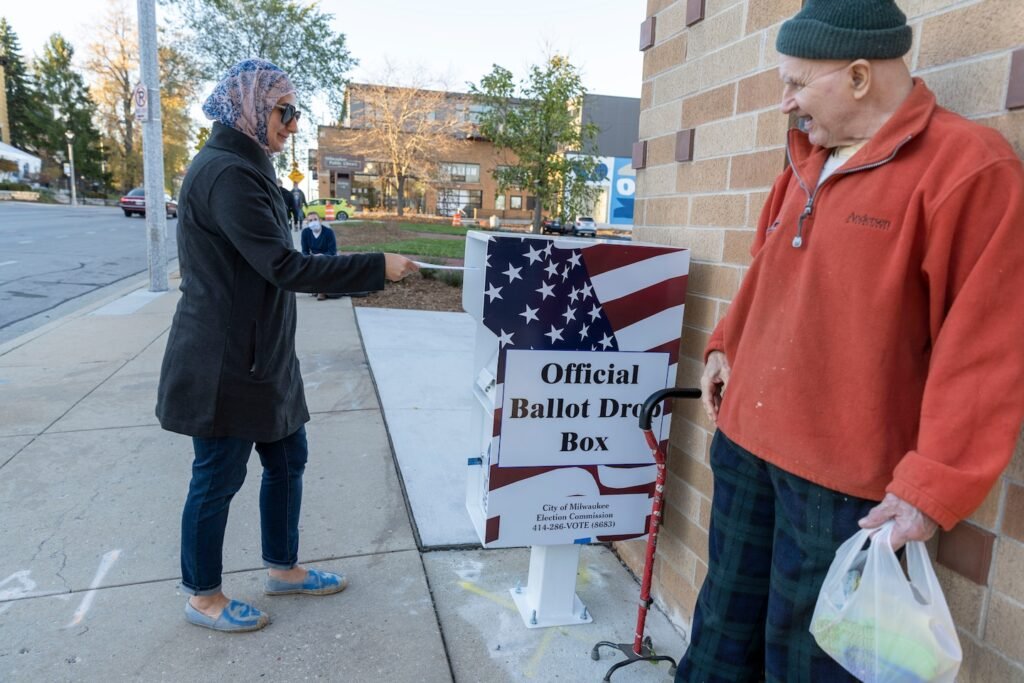Ballot drop boxes have been available in some parts of Wisconsin for years, and their use expanded dramatically during the 2020 presidential election as voters turned to absentee ballots during the COVID-19 pandemic. Leading Wisconsin Republicans supported the boxes at the time but reversed course after Joe Biden narrowly defeated President Donald Trump in the state.
Four months before the 2022 midterm elections, conservatives who then controlled the state Supreme Court ruled in favor of voters who argued that the ballot box couldn’t be used because state law didn’t explicitly allow it. A year later, voters elected a liberal to replace a retiring conservative justice, ending 15 years of conservative control of the Supreme Court.
Soon after, the liberal group Priorities USA filed a lawsuit seeking to reinstate the ballot box, and on Friday a majority ruled in its favor.
State law requires that absentee ballots be returned by mail or in person. Justice Ann Walsh Bradley, writing the majority opinion, said that drop boxes are a means of delivering ballots in person because they are controlled by election officials.
The majority had to overturn the 2022 ruling because its analysis of the case “was not simply wrong but also unfounded in principle,” she wrote.
Dissenting, Justice Rebecca Bradley said the Supreme Court was acting politically and should have stuck to its two-year-old precedent.
“When justices indulge in their own preferences, every case becomes moot when a new justice takes office, replacing the rule of law with the whims of the judge,” wrote Bradley, who is no relation to Justice Ann Walsh Bradley.
Supporters of drop boxes hailed the ruling, saying it gave voters an easy way to return their ballots to be counted. Critics say it’s up to state legislatures to decide whether to allow the devices, and if they do, to set rules to ensure they are properly monitored and evenly distributed across the state.
“This is a major win for voters across Wisconsin,” said David Fox, attorney for Priorities USA, “It will allow voters to use drop boxes to reliably, conveniently and securely return their absentee ballot.”
The decision leaves it up to local officials to decide whether to use drop boxes. Milwaukee Mayor Cavalier Johnson, a Democrat, quickly announced plans to install them starting with the state’s primary election in August. Other Democratic-majority areas are expected to embrace the move.
The ruling could pose a political challenge for local leaders in Republican-leaning areas. President Trump has long derided absentee voting, but some of his allies have begun encouraging the practice. State Republican Party Chairman Brian Shimming denounced the ruling, even though he has supported early voting.
“The Wisconsin Supreme Court’s left-wing Justices have bowed to the demands of out-of-state donors at the expense of Wisconsin, a step backwards for both the separation of powers and public confidence in our elections,” Schimming said in a written statement.
Friday’s decision was a reminder of how judicial elections can quickly change the state’s direction, coming just months after conservatives won a majority on the North Carolina Supreme Court in 2022, overturning recent liberal rulings by approving a voter ID law and restoring Republican redistricting.
Control of the Wisconsin Supreme Court is at stake in April, when Justice Ann Bradley is not seeking reelection and is expected to decide whether abortion can continue in the state before she retires.
The Supreme Court agreed this week to review a lower court judge’s ruling that a 19th-century law did not ban most abortions. The court also accepted a lawsuit filed by Planned Parenthood of Wisconsin seeking to declare that the state’s constitution guarantees a right to an abortion. A ruling in the group’s favor could affect many of the state’s longstanding abortion restrictions, including its 24-hour waiting period.
Meanwhile, a fight looms over a 2011 law that effectively eliminated collective bargaining rights for most Wisconsin public employees. On Wednesday, a judge ruled that parts of the law violate the state Constitution because they treat police and firefighter unions differently from most other public employee unions. The case is expected to go all the way to the Supreme Court, but it’s unclear whether that will happen before or after next year’s elections to decide the court’s seats.
The labor law (Act 10) sparked mass protests and attempts to impeach Governor Scott Walker (Republican), who became the first governor in US history to survive a recall election and served two terms before losing reelection in 2018.

